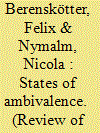| Srl | Item |
| 1 |
ID:
187536


|
|
|
|
|
| Summary/Abstract |
The literature on International Relations theory has yet to align relational theory with role theory, despite the fact that these two theories share so much epistemological common ground. This article uses role theory to bridge the gap between the Confucian and Western conceptions of relationality, whose practitioners regard each other as strangers. With the support of role theory, the comparative analysis of relationality in this article has mainly focused on two different types of relations: prior rule-based relations and improvised relations. The differences in the cultural preparation for these two relations partially explain the plurality of the relational universe and the perception of stranger. Role theory is one way to reconnect the seemingly irreconcilable relational universes. To illustrate the value of a composite agenda of relational theory and role theory, the article will use Kim Jong-un of North Korea as its case. Confucian relations propose that, for all nations, the necessity of having a certain role relation is a more important agenda than insisting on exactly what role to take.
|
|
|
|
|
|
|
|
|
|
|
|
|
|
|
|
| 2 |
ID:
179318


|
|
|
|
|
| Summary/Abstract |
This article revisits and revives the concept of ‘the Stranger’ in theorising international relations by discussing how this figure appears and what role it plays in the politics of (collective) identity. It shows that this concept is central to poststructuralist logic discussing the political production of discourses of danger and to scholarship on ontological security but remains subdued in their analytical narratives. Making the concept of the Stranger explicit is important, we argue, because it directs attention to ambivalence as a source of anxiety and grasps the unsettling experiences that political strategies of conquest or conversion, including practices of securitisation, respond to. Against this backdrop, the article provides a nuanced reading of the Stanger as a form of otherness that captures ambiguity as a threat to modern conceptions of identity, and outlines three scenarios of how it may be encountered in interstate relations: the phenomenon of ‘rising powers’ from the perspective of the hegemon, the dissolution of enmity (overcoming an antagonistic relationship), and the dissolution of friendship (close allies drifting apart). Aware that recovering the concept is not simply an academic exercise but may feed into how the term is used in political discourse and how practitioners deal with ‘strange encounters’, we conclude by pointing to alternative readings of the Stranger/strangeness and the value of doing so.
|
|
|
|
|
|
|
|
|
|
|
|
|
|
|
|
| 3 |
ID:
117882


|
|
|
|
|
| Publication |
2013.
|
| Summary/Abstract |
Ash Amin's Land of Strangers captures succinctly the way the multiplicities of urban life have reshaped our thinking about intercultural relations beyond reified characterisations of ethnicity. Amin draws together an analysis of the ensemble of relations between humans, between humans and the non-human, between work and leisure, and between temporal and spatial relations, to explore our 'society of strangers'. The book provides a productive framework for conceptualising the collaborative commingling that develops across ethnic lines, without losing a sense of imminent conflict, and the pedagogic processes that foster the capacities and habits of living with difference.
|
|
|
|
|
|
|
|
|
|
|
|
|
|
|
|